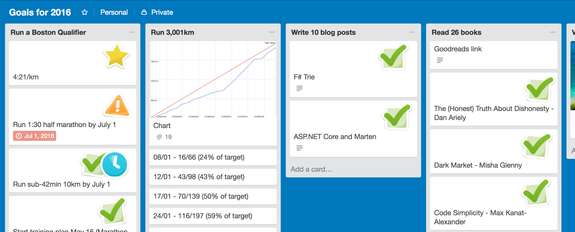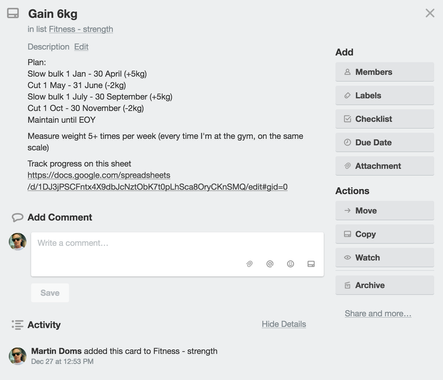Community resources
Community resources
Community resources
Set yourself up for a successful 2018
Hi all! My name is Martin, and I'm a Jira Service Desk Software Developer.
I'm a strong believer in the power of goals, and today I'm going to share with you some of my techniques for setting successful goals for the year ahead.
Prefer goals to resolutions
We all love to set resolutions for the new year. But let's face it - most of us know that we won't follow through. We've all been through this rigmarole before, and many of us have tried and failed often enough that we don't even bother anymore.
This year, instead of setting resolutions why not try setting goals. What's the difference? A resolution is a platitude or worse, an 'intention' to do (or not do) something. A goal, on the other hand, is composed of an expected outcome, a plan, and progress tracking.
Resolution: I will lose weight this year.
Goal: I will lose 10kg this year by counting calories and eating fewer than 1,600 kcal per day, on average. I will allow myself one cheat meal per week, and I will take my birthday and public holidays off.
Resolution: I will drink less this year.
Goal: I will allow myself up to 10 drinking sessions this year, where a 'session' is defined as 3 or more standard drinks. I will also challenge myself to a dry July.
Make your goals SMART
If you've ever read anything about setting goals you're probably already familiar with the SMART system. SMART says all goals should be
- Specific
- Measurable
- Achievable
- Realistic
- Time-bound
Yeah, I guess 'achievable' and 'realistic' are kind of the same. Most new year goals are naturally time-bound, but there's no reason you can't set up goals and sub-goals that are bound to different times of the year.
Not SMART: I will get stronger (this goal is not time-bound or specific).
SMART: I will increase my bench press to 3x95kg and deadlift to 3x155kg by the end of the year.
Not SMART: Learn guitar from scratch and play Slayer's Raining Blood note for note by the end of 2018 (this is specific and time-bound, but not realistic).
SMART: Buy a guitar and spend an average of 2.5 hours/week (5x 30 minutes) on concentrated practice for 2018.
Make a plan
A goal without a plan is just a dream. Every goal you set should have a concrete, trackable plan. If you want to run a marathon, you should know which marathon, which training plan you want to follow and you should have a solid plan in place for building your base before that training plan starts. If you want to restore that old car in the garage you should write up a calendar with sub-goals and milestones for each component - when do you want to start paint work? When will the engine be pulled out?
Of course, no battle plan ever survives first contact with the enemy. Your plans will change over the course of the year. You should adjust as you go, and don't abandon ship the first time things don't go as expected. But just having a plan, to begin with, is what separates a goal from a wish.
Use your tools
Everyone will have their own preferred tools for setting and tracking goals. I have personally favored Trello for the last 3 or 4 years. There are a few ways you can do this - in the past, I have used a column per goal and used cards for various milestones and individual tracking. Here's an example of part of that board.
This year I am trying something different. I'm using the columns for goal categories, cards for individual goals and the card details view for the plan, tracking and milestone info:
Details view:
Track, track, track
Arguably the most important part of achieving a goal is tracking. You know this from work, and there's no reason you can't apply this to your personal life too. I am still searching for the perfect goal tracking solution - ideally, my data is in the cloud, accessible from any device. My perfect tool is flexible enough to track any kind of goal and is simple to use with great reporting features.
In the absence of my ideal tool, I do the majority of my tracking in Google Sheets. It kind of sucks, but it's flexible and it works. Here's a template you can use for tracking your own goals.
It is crucially important that you track your goals diligently. Try setting a recurring calendar reminder to update your goal sheets on a weekly or even daily basis. Tracking against a goal that's not going well can be psychologically taxing, but you can't solve problems by ignoring them.
Know when to hold 'em and when to fold 'em
I believe goals should be achievable but also ambitious. Like many people, I am particularly optimistic at the start of the year, and I set a lot of goals. Although it's important to work hard and give it everything you've got to achieve your goals, there are times when it's ok to let go of a goal. Maybe it turns out you just don't like playing guitar, or the running mileage you were aiming for will just cause you to injure yourself.
Letting go of a goal you have been working hard for is a tough pill to swallow. Find a friend, ask for advice. A good mate will be upfront with you. A good friend will tell you if they think you're pushing too hard and you need a break. A good friend will also tell you when to suck it up and double down.
Have a great and productive 2018.
Cheers,
Was this helpful?
Thanks!
md

Atlassian Community Events
- FAQ
- Community Guidelines
- About
- Privacy policy
- Notice at Collection
- Terms of use
- © 2025 Atlassian








3 comments